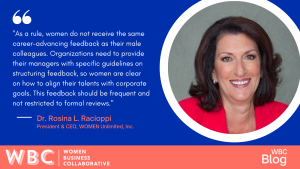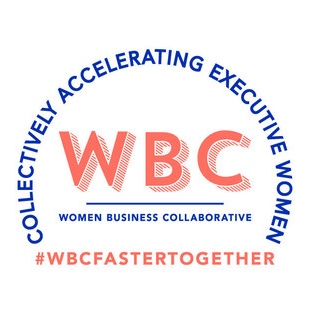
By: Dr. Rosina L. Racioppi, President & CEO, WOMEN Unlimited, Inc.
Over the past month or so, I have had the opportunity to participate in two outstanding programs on strategies and techniques for helping women advance their careers. One was sponsored by WBC and one by my organization, WOMEN Unlimited.
Great ideas came out of each of these programs. As I look back, I see a thread that underlies many of the panelists’ thoughts and suggestions. It goes to something often missing for both the women themselves and their organizations. CLARITY. Clarity of purpose. Clarity of expectations. Clarity of support. Clarity of action steps.
How Lack of Clarity Is Holding Women Back
Lack of clarity is a major cause of women getting stalled at lower levels of management, “the broken rung.” For example:
- Lack of clarity is a saboteur of confidence. Women often lack the confidence to be their own best allies. They are reluctant to ask questions, look for opportunities and seek out mentors and sponsors. To get past this reticence, they need clarity. “What steps should I be taking to get ahead?” “Whom should I be looking to for advice and guidance?” “How can I use my talents and skills to contribute to corporate goals?” “What are those goals?
- Lack of clarity feeds into destructive perfectionism. Women tend to look at advancement as predominantly dependent on outstanding performance. A clearer picture of corporate realities could go a long way in helping them see there’s much more to advancement than doing a great job. They would become more aware of the need, as one panelist put it “of spending as much time on relationships as on tasks.” They would better understand the importance of ensuring that corporate leaders know of them and their competencies. They would rely more heavily on their teams, easing their own burden while building allies.
- Lack of clarity stymies risk taking. Women tend to be more risk-averse than their male colleagues. Although risk taking is the poster child for the absence of clarity, often defined by iffy outcomes, clarity can still be applied to this success strategy. All our panelists pointed out they would not have advanced without taking calculated risks. Clarity can help with risk taking in three ways: (1)Providing a better picture of which risks are worth taking. (2) Pinpointing the best timing for taking a risk both personally and professionally. (3) Formalizing how to handle the risk, including pinpointing those who can provide advice and guidance.
How Corporations Can Make the Path Clearer for Women
Current corporate culture contributes significantly to the “clarity gap” that is impeding women’s advancement. There are a few relatively easy steps organizations can take to help women become clearer about how to get ahead:
- Improve the quality of feedback.
As a rule, women do not receive the same career-advancing feedback as their male colleagues. Organizations need to provide their managers with specific guidelines on structuring feedback, so women are clear on how to align their talents with corporate goals. This feedback should be frequent and not restricted to formal reviews.
- Ensure women have access to mentors and sponsors.
Women are less likely than men to seek out mentors and sponsors, who play a major role in helping women become clear on their goals and their strategies. Organizations must both emphasize the importance of these relationships and provide specific ways for women to seek them out.
- Provide on-going development and support.
There is a tendency to think of development as “one and done.” Nothing could be further from the truth when it comes to helping women have a clearer picture of their talents and their pathways to success. On-going support both individually and in formal development programs is needed to help women address clarity, especially at earlier management levels.
The corporate world is a far cry from the meritocracy women encountered during their school years. A good grade was a good grade. Clear and simple. Women, supported by their organizations, must comfortably thrive in an environment where never again will things be that clearcut.



